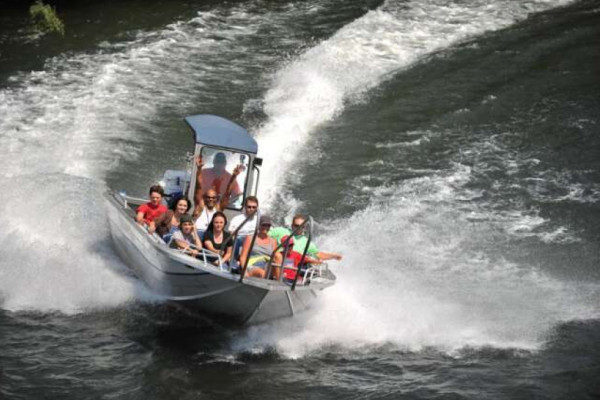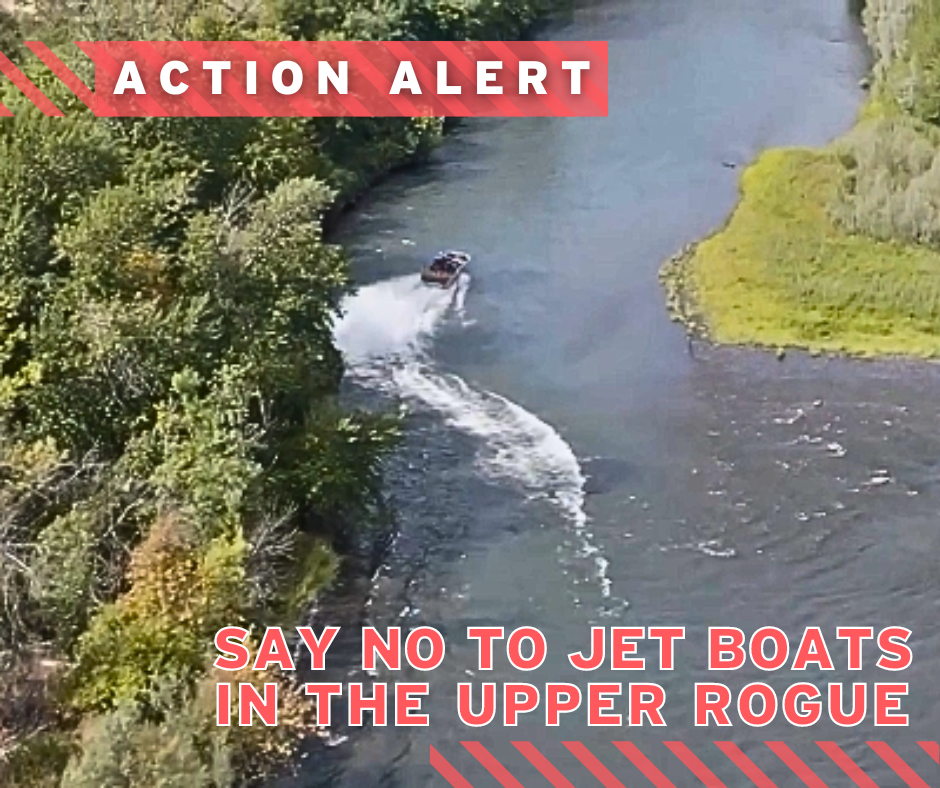Over the past decade, Native Fish Society and other southern Oregon conservation groups have been working to protect the wild native fish of the upper Rogue River from the harmful impacts of large jet boats. And now we ask anyone and everyone who cares about the upper Rogue River to weigh in, once again.
How can you help?
We're asking advocates to submit the Action Alert below, and/or write a personal note to the Oregon State Marine Board by emailing Jennifer.cooper@boat.oregon.gov asking them to put a 15-horsepower restriction in place on the upper Rogue River above Gold Hill.
Upcoming In-person Public Meeting - December 4th
The Oregon Marine Board is having a public hearing on December 4th from 2pm - 6pm at the Rogue Community College Medford Campus Room HEC 129A/B to consider rule-making to regulate jet boat use in the Upper Rogue River (between Fischers Ferry to Lost Creek Dam). Testimony will be limited to 2 to 3 minutes. Invited groups will be testifying in the morning. Please consider attending and providing verbal and written testimony. To provide oral testimony virtually, register with Jennifer Cooper via email at jennifer.cooper@boat.oregon.gov.
The meeting will be a hybrid style and members of the public can view the meeting or provide testimony using this link: https://bit.ly/4fL5SI8
For testimony via phone, call +1 503-446-4951, 475496462# (access code)
Written Testimony - Deadline: December 20th
Written testimony is also accepted until December 20th and can be sent to: Jennifer Cooper, Administrative Rules Coordinator, Oregon State Marine Board, 435 Commercial Street NE, Salem, OR 97301; or e-mailed to: jennifer.cooper@boat.oregon.gov
Please let the Marine Board know that no jet boats should be allowed to operate in the Upper Rogue River above Gold Hill and that you support a 15-horsepower limitation on all watercraft operating in that section.
Please let the Marine Board know any personal experiences you have had with jet boats in this section of the river and how jet boat operation has adversely affected your safety, use, and enjoyment of this section of the river, and your use of the public and private lands along this section of the river, including TouVelle State Recreation Area and Denman Wildlife Management area. Personal comments and letters are the most effective.
Important Talking Points:
Thanks to the help of local Rogue River advocate and conservationist Bob Hunter, Native Fish Society has put together easy talking points for you to pull from to let your voice be heard.
Jet Boat Operations Adversely Affect Water Quality, Fish and Wildlife.
No regulations on jet boat use are in place to protect spawning Wild Native Fish or essential spawning habitat - a.k.a. spawning gravel, which are vulnerable to the turbulence created by jet boats and their wakes. Studies of jet boat impacts on rivers in Alaska, New Zealand, the Snake River, and elsewhere highlight the damage that jet boats can cause to salmon habitat. The risk of harm increases with the frequency of trips and in the upper reaches of rivers where the channel is smaller. Rogue Jet Boat Adventures, a commercial company that operates out of TouVelle State Park claims to have served 14,000 customers last year with its three boats (a 25-passenger, an 18-passenger, and a 10-passenger boat). These huge jet boats roar up and down this fragile, narrow section of the upper Rogue River multiple times all summer long, and now, mini-jet boats, which are just as damaging, are starting to appear. The operation of these boats disrupts the river ecosystem in ways that are harmful and not natural.
Spring Chinook Salmon in the Rogue spawn in this section of river and they are struggling to survive. These fish have been petitioned for listing and could be on the Endangered Species List any day now.
Fish use energy when disturbed by jet boats. Summer Steelhead and Spring Chinook spend numerous months in the upper Rogue River storing energy to spawn in the fall and early winter. Commercial jet boat tours disturb these fish throughout the summer season.
Wakes and hydraulic turbulence from jet boats dislodge sediment, vegetation, and aquatic life from the banks and riverbed causing increases in river turbidity and masses of vegetation to float downstream covering essential macroinvertebrates (food source for juvenile and adult native fish) and winter steelhead redds.
Jet boat wakes can disturb spotted sandpipers and killdeer that nest on gravel bars and kingfishers and rough-winged swallows that nest in streambanks.
The Upper Rogue River riparian areas are important nesting and feeding areas for a wide variety of bird species, including eagles, osprey, and great blue herons. The noise and the wakes from the jet boats disturb birds and disrupt feeding activity.
There is an incentive for jet boats to alter the river channel to keep navigation pathways open, especially in low-flow situations. In at least one instance, a jet boat was observed using its jets to illegally scour out a channel in a salmon spawning area to allow boat passage through a shallow area. The area has not reestablished itself, and it is no longer used by salmon for spawning.
The rules of Denman Wildlife Area prohibit the use of motorized watercraft to protect wildlife, yet jet boats are allowed to speed up and down the section of the Rogue River that bisects the Denman Wildlife Area, disturbing wildlife and refuge users.
The in-water work window for this section of the Rogue River is June 15 to August 31. This is to protect salmon and steelhead. Jet boats can cause more disturbance than a work project in the river and should not be allowed to operate outside of this timeline.
Jet boat use in the Upper Rogue River is not safe for people on the jet boat or for other river users because:
The river in this area is too small and often too shallow to safely accommodate jet boats and other river users.
There are many blind spots on the Upper Rogue where jet boats need to travel at high speeds to navigate. The tour boats operate without spotters and routinely enter these blind spots where a serious collision is just waiting to occur.
In many areas there are limited pathways for a jet boat, maneuverability can be limited and there are many inexperienced boaters on the river, and in places where people are wading and swimming.
In many cases, the jet boats need to operate at high speeds just to navigate shallow rapids.
The wakes created by the jet boats are also a safety hazard to people floating the river, people wading or swimming in the river, and fishermen and guides either fishing from a boat or wade fishing. The wakes can swamp a small inflatable and can knock over people wading in the river. The jet boat tours are part thrill ride and the boats travel at high speeds, do 360’s, and create large wakes.
Jet boat use in the Upper Rogue River is incompatible with traditional uses and has increased user conflicts.
Historically, the Upper Rogue River has been a place to peacefully and safely live, recreate, and enjoy nature and the outdoors. This area had mainly been used for non-motorized boating from drift boats, rafts, inflatables, kayaks, and paddle boards; guided, bank, wade and boat fishing; hiking, birdwatching, picnicking, dog-walking, swimming and just a place to peacefully enjoy the outdoors.
Jet boat operations in the Upper Rogue River are not compatible with these uses. The public’s use and enjoyment of the river and these public lands are adversely affected by jet boat operations and threatened by the future proliferation of jet boats in the Upper Rogue River.
Jet boats push other users out of the navigation pathways and the wakes chase people out of the river all together.
The noise from jet boat operations is pervasive and disrupts the peace and quiet on the river diminishing the quality of people’s experience.
Fishing becomes disrupted by jet boats zipping up and down the river, especially commercial tour boats making multiple trips, and the unsafe wakes they create. A tremendous amount of aquatic vegetation is knocked loose from the boat’s jets and wakes, which foul fishing lines and lures, making it virtually impossible to fish when jet boats are operating.
Jet boat operations are also injuring and adversely affecting the businesses of many guides who operate or used to operate on the section of the river now dominated by jet boat tours. If jet boat use, especially tour boat use were allowed to increase throughout the Upper Rogue River, this would greatly curtail the ability to guide or fish.
The current proposal seems tailored to favor a single commercial operator at the expense of other river users.
Thank you for taking the time to make your voice heard! If you have any questions regarding this process or would like to discuss jet boats on the upper Rogue more, please email us at info@nativefishsociety.org.

